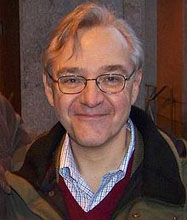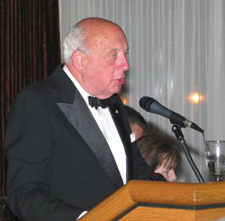Conservatives, liberals, and US health care bill .. may have implications in Canada too
Oct 30th, 2009 | By Citizen X | Category: In Brief
E.J. Dionne : “a very in-demand columnist of the Washington Post, frequent flyer on MSNBC, NPR” and other good places in the USA today.
Comments from two vastly different commentators on “conservatives” and “liberals” in the USA shed light on why President Obama is so cautious about the emerging health care bill in Washington (and, with some far northern twists, maybe on the strange Canadian dance of Conservatives and Liberals in Ottawa today as well).
First is progressive journalist E.J. Dionne’s “quick take” in the October 28, 2009 Washington Post on “Is America really becoming more conservative?” He is himself cautious about recent “Gallup numbers” in which: “Forty percent of Americans describe their political views as conservative, 36 percent as moderate, and 20 percent as liberal” – marking “a shift from 2005 through 2008, when moderates were tied with conservatives as the most prevalent group.”
Dionne notes other polls show similar results, but stresses that the magnitudes are small. In similar Pew surveys for January to June of this year, e.g., the “numbers were: 37.9 percent moderate, 36.9 percent conservative and 19.7 percent liberal.” From July to the present “there was a shift (of 1.6 percent) toward the conservatives. The numbers were: 38.5 percent conservative, 35.5 percent moderate and 20.1 percent liberal.”
Still more strikingly: “polls that give respondents the chance of calling themselves ‘progressive’ produce a substantially larger number on the left end of the spectrum, since many who won’t pick the ‘liberal’ label do call themselves ‘progressive.’ A study earlier this year by the Center for American Progress found that when progressive and libertarian were offered as additional options, the country was split almost exactly in half between left and right.”
Not long after stumbling across E.J. Dionne’s latest intelligence here, I found myself re-reading “The Problem of American Conservatism” by the unusual and almost always interesting American-Hungarian conservative historian, John Lukacs. (It first appeared in 1984, and was then re-published in 2005.)
Lukacs adds historical depth to the recent polling numbers Dionne comments on. E.g.: In the beginning, “the liberal vision was the dominant American vision, propounded by Jefferson”; “During the late 1940s the designation ‘conservative’ was still shunned by every American politician.” Yet by the 1950s the “the realignment of American politics that took shape twenty-five years later was already in the making.”

John Lukacs, who ordinarily resides in the Philadelphia exurbs, is speaking here at the Vancouver Club, May 3, 2004 – on one of his favourite subjects, Winston Churchill.
Lukacs goes on: “as late as 1955 few Americans would accept the designation ‘conservative’ … twenty-three years later opinion polls … showed that more Americans preferred to designate themselves as conservatives than as liberals” ; the “first national magazine of the conscious conservative movement, William F. Buckley’s National Review, appeared in 1955” ; “In 1980 the landslide triumph of Ronald Reagan coincided with the twenty-fifth anniversary of the … National Review. A glittering celebration took place in the Plaza Hotel in New York.”
Another more progressive realignment of American politics actually may have begun with the election of Barack Obama in 2008. Some big enough step forward in US health care reform will help move the long process of realignment along. But no change of this sort ever happens overnight. Liberals and progressives still have much work to do. It may even be that these essentially US trends suddenly have some fresh implications for a changing Canadian confederation in the far north too.


I tend to think the shift was an overdue reaction to the shift in liberalism. Defending 18th-century liberalism is basically conservative now.
I generally agree with Lukacs’ skepticism of American conservatism, which seems to be a huge proponent of consumerism and consumption and conserves… what? And American conservatives also seem to be huge proponents of Progress, which is… not conservative.